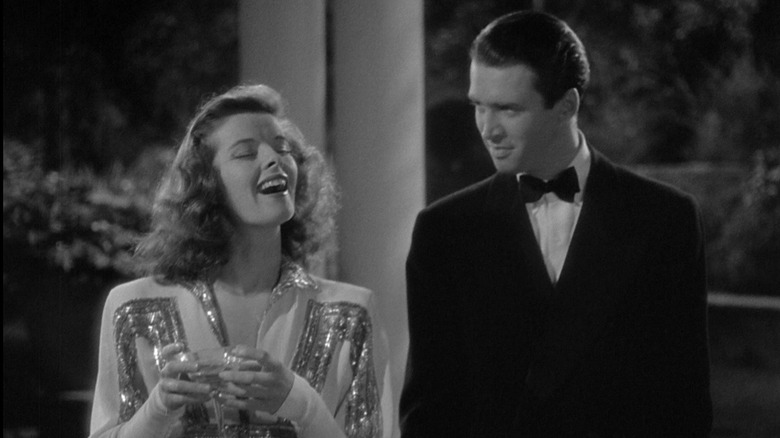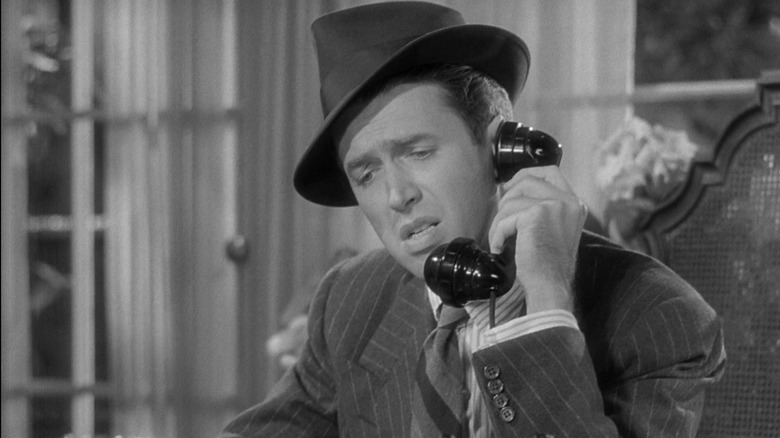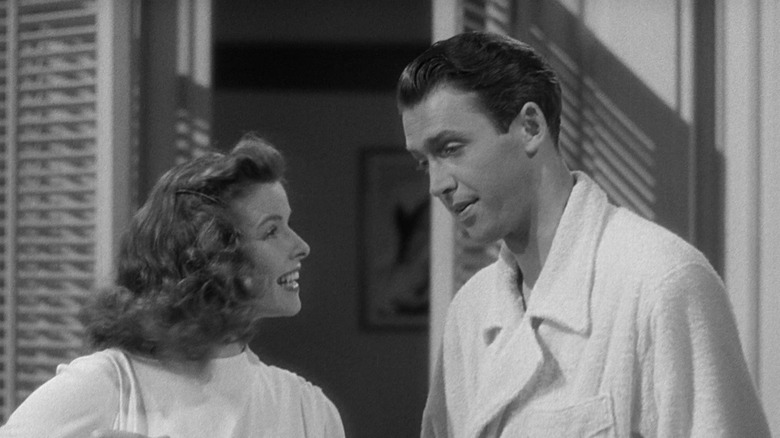Romancing Katharine Hepburn In The Philadelphia Story Was A Struggle For James Stewart
Despite allegedly scaring Alfred Hitchcock with his yelling, James Stewart really did live up to his polite everyman reputation. He's one of the biggest stars in Hollywood history and yet retained humility throughout his decades-long career, even finding time to rise up the ranks of the military and fight in World War II between starring in some of the biggest movies of his day. He passed away in 1997 having built a career full of classic movie moments and never once tarnished his reputation as a class act (Hitchcock probably deserved some dressing down). In fact, beyond being self-effacing, Stewart was known for being quite shy off-screen — a trait that, every now and then, would seemingly trip him up on set.
So it was with 1940's "The Philadelphia Story" — a vehicle for Katherin Hepburn's comeback after the actress found herself on Harry Brandt's infamous "box office poison list." Her turn in the 1938 screwball comedy "Bringing Up Baby" had proven a box office flop and audiences seemingly turned on the starlet. But Hepburn's redemption would come after Broadway playwright Philip Barry wrote "The Philadelphia Story" as a play specifically for the actress, which became a hit. Hepburn, who'd been given the rights to the play, sold them to MGM for $250,000 with the caveat that she would be able to choose the director and cast for the resulting film.
Stewart was hired to play Macaulay "Mike" Connor, one of the two male leads alongside Cary Grant as C.K. Dexter Haven. Mike was a reporter for "Spy" Magazine who covers the marriage between Tracy Lord (Hepburn) and George Kittredge (John Howard) and ends up falling for Lord. Naturally, the film required Stewart to turn on the romance in some crucial scenes but it seems it didn't come naturally to the seasoned actor.
'Not exactly a Jimmy Stewart line'
In a later interview, Stewart recounted how he would, "Get a heavy crush on every girl that was in every picture [he] did." The son of a hardware store owner and piano teacher from the coal mining town of Indiana, Pennsylvania had eschewed much of the glitz that came with being a Hollywood star, managing to maintain the humility of his small-town upbringing in an industry that was anything but. That gave him the classic movie star ability to do nothing well, but it didn't necessarily mean he was a natural when it came to on-screen romance — especially considering this small-town all-American couldn't help but catch feelings for every actress he starred alongside.
Unsurprisingly, when it came time for a pivotal scene in "The Philadelphia Story," where Mike professes his innermost feelings for Tracy, Stewart struggled. As recounted in Roy Pickard's "Jimmy Stewart: A Life In Film," the scene required Stewart to take Hepburn in his arms and recite some lines that were so overwrought and flowery they bordered on parody. According to Hepburn, "It did really cause him the most terrible distress. He had to say: 'There's a magnificence in you Tracy, a magnificence that comes out of your eyes, that's in your voice, in the way you stand... You've got fires banked down in you, hearth fires and holocausts.' Well, it was not exactly a Jimmy Stewart line."
As the actress remembers it, Stewart rehearsed the scene with her and, "Nearly died," before director George Cukor stepped in and told Stewart: "Jimmy, you're not running away to the circus so don't paw the ground with your foot. Just say it." That seemingly worked, as according to Hepburn, Stewart "Took a deep breath and he said it. He was magnificent."
Stewart the consummate professional
It wasn't the first time Stewart had struggled with a line. There was a particularly frustrating scene in his previous film, "The Shop Around The Corner," which caused him similar problems. The scene involved him and his love interest, Margaret Sullavan, and required Stewart to say he would roll his trousers up on the street to prove her wrong. For whatever reason, it took 48 takes to get the line right — the most he would ever do in his career.
Was his tendency to form a "Heavy crush" on every girl he worked with to blame? Possibly. But both "Shop" and "Philadelphia" were shot and released before his experience of World War Two made Stewart an entirely different actor — morphing his mild-mannered demeanor into something noticeably rougher. Had he shot these romantic scenes after shedding much of that more innocent aura, perhaps he wouldn't have struggled as much.
Still, when he did struggle it was only momentarily. Otherwise, Stewart was a consummate professional, and even seemed to be having fun on the set of "Philadelphia." One scene, in particular, saw him improvising a hiccup while playing drunk, almost causing his co-star Grant to crack. Otherwise, the screenplay for "Philadelphia" was undeniably wordy, requiring long flowery speeches from its various stars throughout. Alongside probably having a big crush on Hepburn, then, Stewart was also having to contend with some unwieldy language, which makes it remarkable that the final scene seems as effortless as it does.


